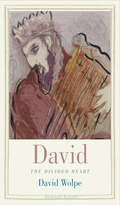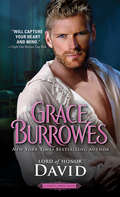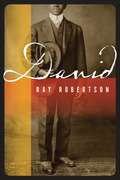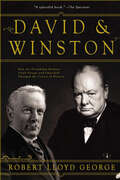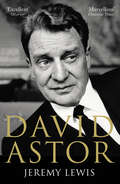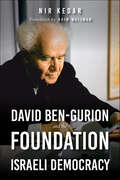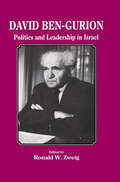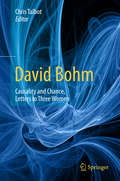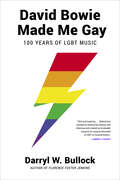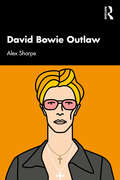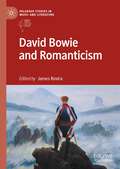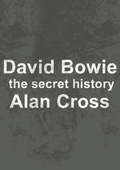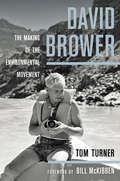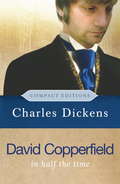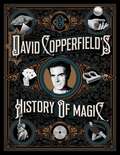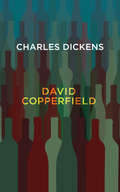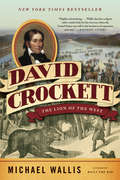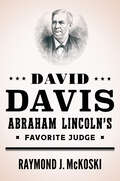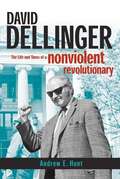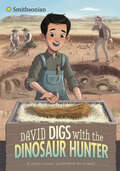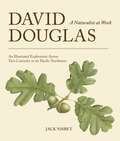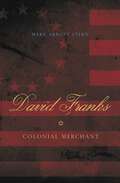- Table View
- List View
Dave the Potter: Artist, Poet, Slave
by Laban Carrick HillTo us it is just dirt, the ground we walk on... But to Dave it was clay, the plain and basic stuff upon which he formed a life as a slave nearly 200 years ago. Dave was an extraordinary artist, poet, and potter living in South Carolina in the 1800s. He combined his superb artistry with deeply observant poetry, carved onto his pots, transcending the limitations he faced as a slave. In this inspiring and lyrical portrayal, National Book Award nominee Laban Carrick Hill's elegantly simple text and award-winning artist Bryan Collier's resplendent, earth-toned illustrations tell Dave's story, a story rich in history, hope, and long-lasting beauty.<P><P>Winner of the Coretta Scott King Medal
David
by David WolpeOf all the figures in the Bible, David arguably stands out as the most perplexing and enigmatic. He was many things: a warrior who subdued Goliath and the Philistines; a king who united a nation; a poet who created beautiful, sensitive verse; a loyal servant of God who proposed the great Temple and founded the Messianic line; a schemer, deceiver, and adulterer who freely indulged his very human appetites. David Wolpe, whom Newsweek called "the most influential rabbi in America," takes a fresh look at biblical David in an attempt to find coherence in his seemingly contradictory actions and impulses. The author questions why David holds such an exalted place in history and legend, and then proceeds to unravel his complex character based on information found in the book of Samuel and later literature. What emerges is a fascinating portrait of an exceptional human being who, despite his many flaws, was truly beloved by God.
David
by Grace BurrowesDavid, Viscount Fairly, has imperiled his honor... Letty Banks is a reluctant courtesan, keeping a terrible secret that brought her, a vicar's daughter, to a life of vice. While becoming madam of Viscount Fairly's high-class brothel is an absolute financial necessity, Letty refuses to become David's mistress-though their attraction becomes harder to resist the more she learns about the man... Perhaps a fallen woman can redeem it. David is smitten not only with Letty's beauty, but also with her calm, her kindness, her quiet. David is determined to put respectability back in her grasp, even if that means uncovering the secrets Letty works so hard to keep hidden-secrets that could take her away from him forever... Award-winning New York Times and USA Today bestselling author Grace Burrowes's extraordinary writing will immerse you in a Regency world unlike any you've experienced.
David
by Ray Robertson"God and whiskey have got me where I am. Too little of the one, too much of the other."-David King, 1895.Born a slave in 1847, but raised as a free man by the Reverend William King, David has rebelled against his emancipator and his predestined future in the church. He's taken up residence in the nearby town of Chatham, made a living robbing graves, and now presides-in the company of a German ex-prostitute named Loretta-over an illegal after-hours tavern.These days that final, violent confrontation with Reverend King seems like a lifetime ago. The residents of Chatham know David as a God-cursing, liquor-slinging, money-having man-about-town, famously educated and fabulously eccentric. And he seems to be more-or-less happy ... that is, until the death of Reverend King brings his past crashing down upon him.Inspired by the Elgin Settlement, which by 1852 housed 75 free black families and was studied by Lincoln and Harriet Beecher Stowe, David is a fiery look at one man's quest for knowledge and forgiveness, and a moving portrait of life after the Underground Railroad.Ray Robertson is the author of Why Not? Fifteen Reasons to Live.
David & Winston: How the Friendship Between Lloyd George and Churchill Changed the Course of History
by Robert Lloyd GeorgeThis “splendid book” recounts the relationship between twentieth-century Britain’s two great wartime prime ministers (The Spectator).Both were outsiders. Neither attended university. Above all, both loved political sparring—often together, in the epic parliamentary battles of the start of the century. Winston Churchill and David Lloyd George shared a deeply personal friendship. For ten years between 1904 and 1914 they met every day for a private discussion. Lloyd George profoundly influenced Churchill’s political philosophy and played a formative role in his career. Drawing on unseen family archive material, Robert Lloyd George provides an intimate biography of the friendship between his great-grandfather and Churchill, from their public politics to their private passions. He throws fresh light on the two greatest statesmen of twentieth century Britain in peace and in war, and on one of the most enduring friendships in modern politics.“Lively and readable.” —Mail on Sunday
David Astor
by Jeremy LewisFew newspaper editors are remembered beyond their lifetimes, but David Astor of the Observer is a great exception to the rule. He converted a staid, Conservative-supporting Sunday paper into essential reading, admired and envied for the quality of its writers and for its trenchant but fair-minded views. Astor grew up at Cliveden, the country house on the Thames which his grandfather had bought when he turned his back on New York, the source of the family fortune. His liberal-minded father was a constant support, but his relations with his mother, Nancy, were always embattled. At Oxford he suffered the first of the bouts of depression that were to blight his life; a lost soul for much of the Thirties, he became involved in attempts to put the British Government in touch with the German opposition in the months leading up to the war. George Orwell had urged Astor to champion the decolonisation of Africa, and Nelson Mandela always acknowledged how much he owed to the Observer’s long-standing support. A generous benefactor to good causes, he helped to set up Amnesty International and Index on Censorship. A good man and a great editor, he deserves to be better remembered.
David Ben-Gurion and the Foundation of Israeli Democracy (Perspectives on Israel Studies)
by Nir KedarIn David Ben-Gurion and the Foundation of Israeli Democracy, Nir Kedar offers a poignant study of the primary national founder of the State of Israel and the first prime minister of Israel. Kedar provides an explication of the making of Israeli democracy in terms of its institutional-legal structures and social-cultural underpinnings. David Ben-Gurion and the Foundation of Israeli Democracy connects the formal structures of democracy to the fundamental principles that they were constructed to serve—human freedom and dignity.
David Ben-Gurion and the Jewish Renaissance
by Shlomo Aronson Naftali GreenwoodThis book offers a reappraisal of David Ben-Gurion's role in Jewish-Israeli history from the perspective of the twenty-first century, in the larger context of the Zionist "renaissance," of which he was a major and unique exponent. Some have described Ben-Gurion's Zionism as a dream that has gone sour, or a utopia doomed to be unfulfilled. Now - after the dust surrounding Israel's founding father has settled, archives have been opened, and perspective has been gained since Ben-Gurion's downfall - this book presents a fresh look at this statesman-intellectual and his success and tragic failures during a unique period of time that he and his peers described as the "Jewish renaissance. " The resulting reappraisal offers a new analysis of Ben-Gurion's actual role as a major player in Israeli, Middle Eastern, and global politics.
David Ben-Gurion: Politics and Leadership in Israel
by Ronald W ZweigFirst published in 2004. It may well be that genius begins where fear ends: not to be afraid to question what is known, not to be afraid to be original. David Ben-Gurion did not try to imitate anyone...He was endowed with a mind that sought out whats was new and was capable of penetrating the deepest recesses. First and foremost, he challenged every Jew who believed it was the fate of Jews to live in the Diaspora, and he believed that the Jews could be a nation of farmers, industrialists, soldiers, pioneers, and not only scientists and intellectuals. He decided that the time had come to establish a Jewish state, yet once it had been founded, he was not satisfied- it must be an exemplary state, a chosen state.
David Bohm: Causality and Chance, Letters to Three Women
by Chris TalbotThe letters transcribed in this book were written by physicist David Bohm to three close female acquaintances in the period 1950 to 1956. They provide a background to his causal interpretation of quantum mechanics and the Marxist philosophy that inspired his scientific work in quantum theory, probability and statistical mechanics. In his letters, Bohm reveals the ideas that led to his ground breaking book Causality and Chance in Modern Physics. The political arguments as well as the acute personal problems contained in these letters help to give a rounded, human picture of this leading scientist and twentieth century thinker.
David Bowie Made Me Gay: 100 Years of LGBT Music
by Darryl W. BullockLGBT musicians have shaped the development of music over the last century, with a sexually progressive soundtrack in the background of the gay community’s struggle for acceptance. With the advent of recording technology, LGBT messages were for the first time brought to the forefront of popular music. David Bowie Made Me Gay is the first book to cover the breadth of history of recorded music by and for the LGBT community and how those records influenced the evolution of the music we listen to today.
David Bowie Outlaw: Essays on Difference, Authenticity, Ethics, Art & Love
by Alex SharpeThis book explores the relevance of David Bowie’s life and music for contemporary legal and cultural theory. Focusing on the artist and artworks of David Bowie, this book brings to life, in essay form, particular theoretical ideas, creative methodologies and ethical debates that have contemporary relevance within the fields of law, social theory, ethics and art. What unites the essays presented here is that they all point to a beyond law: to the fact that law is not enough, or to be more precise, too much, too much to bear. For those who, like Bowie, see art, creativity and love as what ought to be the central organising principles of life, law will not do. In the face of its certainties, its rigidities, and its conceits, these essays, through Bowie, call forth the monster who laughs at the law, celebrate inauthenticity as a deeper truth, explore the ethical limits of art, cut up the laws of writing and embrace that which is most antithetical to law, love. This original engagement with the limits of law will appeal to those working in legal theory, ethics and law and popular culture, as well as in art and cultural studies.
David Bowie and Romanticism (Palgrave Studies in Music and Literature)
by James RoviraDavid Bowie and Romanticism evaluates Bowie’s music, film, drama, and personae alongside eighteenth- and nineteenth-century poets, novelists, and artists. These chapters expand our understanding of both the literature studied as well as Bowie’s music, exploring the boundaries of reason and imagination, and of identity, gender, and genre. This collection uses the conceptual apparata and historical insights provided by the study of Romanticism to provide insight into identity formation, drawing from Romantic theories of self to understand Bowie’s oeuvre and periods of his career. The chapters discuss key themes in Bowie’s work and analyze what Bowie has to teach us about Romantic art and literature as well.
David Bowie: the secret history
by Alan CrossAlan Cross is the preeminent chronicler of popular music.Here he provides a history of David Bowie's career from his start as Davy Jones through the end of the millennium.This look at Bowie—"Shape-shifter, Actor, Artist, Gay Icon"—is adapted from the audiobook of the same name.
David Brower
by Tom TurnerIn this first comprehensive authorized biography of David Brower, a dynamic leader in the environmental movement over the last half of the twentieth century, Tom Turner explores Brower's impact on the movement from its beginnings until his death in 2000. Frequently compared to John Muir, David Brower was the first executive director of the Sierra Club, founded Friends of the Earth, and helped secure passage of the Wilderness Act, among other key achievements. Tapping his passion for wilderness and for the mountains he scaled in his youth, he was a central figure in the creation of the Point Reyes National Seashore and of the North Cascades and Redwood national parks. In addition, Brower worked tirelessly in successful efforts to keep dams from being built in Dinosaur National Monument and the Grand Canyon. Tom Turner began working with David Brower in 1968 and remained close to him until Brower's death. As an insider, Turner creates an intimate portrait of Brower the man and the decisive role he played in the development of the environmental movement. Culling material from Brower's diaries, notebooks, articles, books, and published interviews, and conducting his own interviews with many of Brower's admirers, opponents, and colleagues, Turner brings to life one of the movement's most controversial and complex figures.
David Copperfield
by Charles DickensCompact editions - David Copperfield in half the time.<P><P> The eighth novel from one of the English language's most important writers, Charles Dickens' David Copperfield is considered a masterpiece.<P>Originally published in 1850, the book tells the titular character's life story as he escapes an unhappy childhood with his stepfather and strikes out on his own, encountering a memorable cast of characters. Through his life, David encounters comedy and tragedy, kindness and cruelty and grows as a character. <P>There are many details in the book drawn from Dickens' own life, and he referred to the character of Copperfield as his "favourite child".
David Copperfield
by Charles DickensCompact editions - David Copperfield in half the time.David Copperfield's happy childhood is abruptly ended by his mother's remarriage to Mr Murdstone. After enduring the misery of Salem House Academy and a life of drudgery in his step father's business, he runs away to his eccentric aunt, Betsey Trotwood, in Dover, and transforms his life a second time - finding friendship with the ever optimistic Mr Micawber and falling in love with the adorable but spoilt Dora. But David has to face tragedy, and outface the scheming Uriah Heep before he finds ultimate happiness.
David Copperfield's History of Magic
by Richard Wiseman David Copperfield David BritlandAn illustrated, illuminating insight into the world of illusion from the world&’s greatest and most successful magician, capturing its audacious and inventive practitioners, and showcasing the art form&’s most famous artifacts housed at David Copperfield&’s secret museum.In this personal journey through a unique and remarkable performing art, David Copperfield profiles twenty-eight of the world&’s most groundbreaking magicians. From the 16th-century magistrate who wrote the first book on conjuring to the roaring twenties and the man who fooled Houdini, to the woman who levitated, vanished, and caught bullets in her teeth, David Copperfield&’s History of Magic takes you on a wild journey through the remarkable feats of the greatest magicians in history. These magicians were all outsiders in their own way, many of them determined to use magic to escape the strictures of class and convention. But they all transformed popular culture, adapted to social change, discovered the inner workings of the human mind, embraced the latest technological and scientific discoveries, and took the art of magic to unprecedented heights. The incredible stories are complimented by over 100 never-before-seen photographs of artifacts from Copperfield&’s exclusive Museum of Magic, including a 16th-century manual on sleight of hand, Houdini&’s straightjackets, handcuffs, and water torture chamber, Dante&’s famous sawing-in-half apparatus, Alexander&’s high-tech turban that allowed him to read people&’s minds, and even some coins that may have magically passed through the hands of Abraham Lincoln. By the end of the book, you&’ll be sure to share Copperfield&’s passion for the power of magic.
David Copperfield: Roman Anglais. Tome 2
by Charles Dickens“The most perfect of all the Dickens novels.” –Virginia WoolfWhen David Copperfield escapes from the cruelty of his childhood home, he embarks on a journey to adulthood which will lead him through comedy and tragedy, love and heartbreak and friendship and betrayal. Over the course of his adventure, David meets an array of eccentric characters and learns hard lessons about the world before he finally discovers true happiness.Penguin Random House Canada is proud to bring you classic works of literature in e-book form, with the highest quality production values. Find more today and rediscover books you never knew you loved.
David Crockett: The Lion of the West
by Michael Wallis"Vivid, Comprehensible . . . cuts through decades of mythmaking." --Texas Monthly Popular culture transformed his memory into "Davy Crockett," and Hollywood gave him a raccoon hat he hardly ever wore. In this surprising New York Times bestseller, historian Michael Wallis has cast a fresh look at the flesh-and-blood man behind one of the most celebrated figures in American history. More than a riveting story, Wallis's David Crockett is a revelatory, authoritative biography that separates fact from fiction and provides us with an extraordinary evocation of not only a true American hero but also the rough-and-tumble times in which he lived.
David Davis, Abraham Lincoln's Favorite Judge
by Raymond J. McKoskiOne of Abraham Lincoln’s staunchest and most effective allies, Judge David Davis masterminded the floor fight that gave Lincoln the presidential nomination at the 1860 Republican National Convention. This history-changing event emerged from a long friendship between the two men. It also altered the course of Davis’s career, as Lincoln named him to the U.S. Supreme Court in 1862. Raymond J. McKoski offers a biography of Davis’s public life, his impact on the presidency and judiciary, and his personal, professional, and political relationships with Lincoln. Davis lent his vast network of connections, organizational and leadership abilities, and personal persuasiveness to help Lincoln’s political rise. When Davis became a judge, he honed an ability to hear each case with complete impartiality, a practice that endeared him to Lincoln but one day put him at odds with the president over important Civil War–era rulings. McKoski details these cases while providing an in-depth account of Davis’s role in Lincoln’s two unsuccessful campaigns for U.S. Senate and the fateful run for the presidency.
David Dellinger: The Life and Times of a Nonviolent Revolutionary
by Andrew E. HuntThe year was 1969. In a Chicago courthouse, David Dellinger, one of the Chicago Eight, stood trial for conspiring to disrupt the National Democratic Convention. Dellinger, a long-time but relatively unknown activist, was suddenly, at fifty-three, catapulted into the limelight for his part in this intense courtroom drama. From obscurity to leader of the antiwar movement, David Dellinger is the first full biography of a man who bridged the gap between the Old Left and the New Left. Born in 1915 in the upscale Boston suburb of Wakefield to privilege, Dellinger attended Yale during the Depression, where he became an ardent pacifist and antiwar activist. Rejecting his parents’ affluent lifestyle, he endured lengthy prison sentences as a conscientious objector to World War II and created a commune in northern New Jersey in the 1940s, a prototype for those to follow twenty years later.His instrumental role in the creation of Liberation magazine in 1956 launched him onto the national stage. Writing regular essays for the influential radical monthly on the arms race and the Civil Rights movement, he earned an audience among the New Left radicals. As anti-Vietnam sentiment grew, he became, in Abbie Hoffman’s words, the father of the antiwar movement and the architect of the 1968 demonstrations in Chicago. He remained active in anti-war causes until his death on May 25, 2004 at age 88.Vilified by critics and glorified by supporters, Dellinger was a man of contradictions: a rigid Ghandian who nonetheless supported violent revolutionary movements; a radical thinker and gifted writer forced to work as a baker to feed his large family; and a charismatic leader who taught his followers to distrust all leaders. Along the way, he encountered Eleanor Roosevelt, Ho Chi Minh, Martin Luther King, Jr., the Black Panthers and all the other major figures of the American Left.The remarkable story of a stubborn visionary torn between revolution and compromise, David Dellinger reveals the perils of dissent in America through the struggles of one of our most important dissenters.
David Digs with the Dinosaur Hunter (Smithsonian Historical Fiction)
by Ailynn CollinsWhen David and his parents arrive in Lusk, Wyoming, in 1889, they are not welcomed with open arms. As Chinese immigrants, they are all too familiar with the discrimination they immediately encounter at the general store. Nonetheless, their need to earn money before continuing eastward leads them to find work at John Bell Hatcher’s archaeological dig site just outside of town. Soon David learns that the brilliant paleontologist is on the hunt for dinosaur bones! Can he help Hatcher make the dino discovery of a lifetime?
David Douglas, a Naturalist at Work: An Illustrated Exploration Across Two Centuries in the Pacific Northwest
by Jack NisbetDuring a meteoric career that spanned from 1825 to 1834, David Douglas made the first systematic collections of flora and fauna over many parts of the greater Pacific Northwest. Despite his early death, colleagues in Great Britain attached the Douglas name to more than 80 different species, including the iconic timber tree of the region. David Douglas, a Naturalist at Work is a colorfully illustrated collection of essays that examines various aspects of Douglas's career, demonstrating the connections between his work in the Pacific Northwest of the 19th century and the place we know today. From the Columbia River's perilous bar to luminous blooms of mountain wildflowers; from ever-changing frontiers of technology to the quiet seasonal rhythms of tribal families gathering roots, these essays collapse time to shed light on people and landscapes. This volume is the companion book to a major museum exhibit about Douglas's Pacific Northwest travels that will open at the Northwest Museum of Arts & Culture in Spokane in September 2012.From the Hardcover edition.
David Franks: Colonial Merchant (Keystone Books)
by Mark Abbott SternDavid Franks, a colonial businessman in Philadelphia, was one of the most important figures in American Jewish history in the eighteenth century. This extensively researched biography illuminates not only Franks's personal dealings, but also his business life. Franks was involved with Indian trade, ship design and building, manufacturing, international trade, land speculation, westward exploration, and military provisioning. This volume follows Franks from his beginnings in a prominent Jewish family to his trials for treason and his exile in the postrevolutionary period, offering a unique portrait of a forgotten American.

